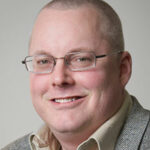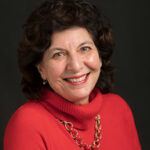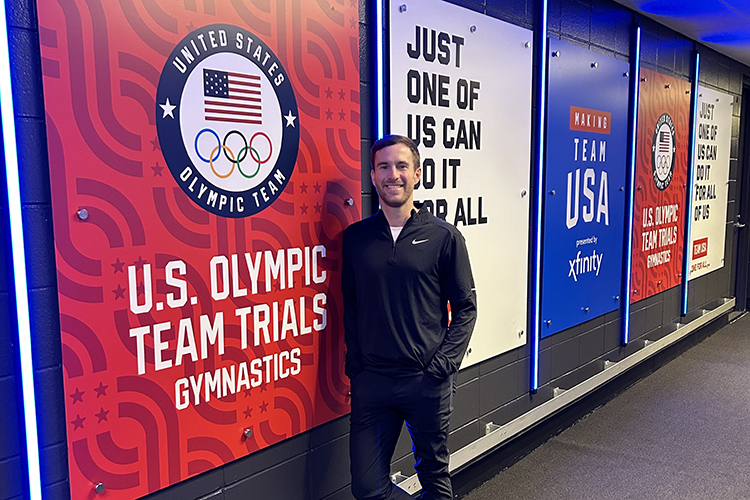By Kathy Quirk
When Mike Clark was in high school, an AP class in psychology piqued his interest in how people think and why they do what they do. After school, when he was running track, Waukesha South coach Darrell Gramdorf stressed the importance of mental preparation.
Those intertwining interests eventually came together in his career. Clark, who earned his doctorate in Counseling Psychology through UWM’s School of Education, was recently added to the United States Olympic & Paralympic Committee roster as a psychological services provider ahead of the 2024 Paris Olympic Games, which begin this week.
The focus of the work, he said, is to help support Team USA athletes in both mental health and mental performance.
While he isn’t among the few staff members traveling to Paris, Clark has been working with Team USA athletes at training camps in Colorado Springs to prepare for pre-Olympic qualifying competitions and the games. He’ll also be available via Zoom to support the athletes in Paris and after they return to the U.S.
The focus of the work, he said, is to help support Team USA athletes in both mental health and mental performance.
Identity wrapped up in Olympics
Olympic-level athletes face some unique mental health challenges, Clark said. “So much identity is wrapped up in the Games. No matter the outcome, some devote, four, eight, 12 years of their life to their craft.”
In addition to being a licensed psychologist, Clark is a certified mental performance consultant with the Association for Applied Sport Psychology. As a CMPC, Clark helps the athletes work on issues such as better focus, confidence, composure and dealing with fan and media expectations. “We try to help them do their best.”
In addition to competition concerns, Clark said, athletes face mental health challenges just like everyone else – stress, insomnia, anxiety, depression, trauma, eating disorders, body image and other issues.
“A lot of the time I’m doing traditional talk therapy,” Clark said, “but the population happens to be Olympians, almost-Olympians, Olympians from the last quad or other athletes who are on our national teams.”
While his high school experiences formed his initial interest in psychology, he pinpointed his career interest to one morning during winter break at his parents’ home in Waukesha. At the time, he was studying psychology and running on the track team at Mississippi State University. He was eating cereal at the family’s breakfast table, he recalled, when he read an article in the Milwaukee Journal Sentinel about a sports psychologist who earned credentials for the Olympic Games. That interested him as a future career direction, he said.
Coach, advisor give guidance
He talked to his college coach about it, and asked who he should talk to. “That kind of led me to get into the field.” He then earned an M.Ed in counseling psychology with an emphasis on sports psychology from the University of Missouri.
Clark’s advisor there suggested he earn his PhD. “You’re going to want to help people all over the spectrum of mental health and mental performance. More training and licensure as a psychologist will help you do that,” the advisor told him.
While I wanted to be a competent psychologist, I was still really switched into the sport world. UWM allowed me to do both of those things – to deepen my knowledge as a psychologist, but also pursue training experiences on the side in sport performance.
He came to UWM for the doctoral degree because he wanted to deepen his clinical skills and understanding.
“While I wanted to be a competent psychologist, I was still really switched into the sport world. UWM allowed me to do both of those things – to deepen my knowledge as a psychologist, but also pursue training experiences on the side in sport performance.”
The fact that UWM was an R1 research institution and American Psychological Association accredited, and that his mom, dad and sister are all UWM alumni, also played a role in his decision, he said.
Cultural competence


Clark appreciated the UWM program’s focus on becoming a culturally competent counseling psychologist. He remembers especially mentors like his advisor Professor Stephen Wester and Nadya Fouad, distinguished professor and department chair, who recently retired after 40 years at UWM.
“When I think about my time at UWM, the focus was always to be the most competent, ethical psychologist you could be, and to be really human and relate to people. I found those things to be the cornerstones, and it’s all remained the same. I’m really grateful for that.”
Kweku Ramel Smith, who earned his doctorate in psychology at UWM, also serves on the Olympic/Paralympic psychological services committee.
The 2024 Paris Olympics officially kicks off with the opening ceremonies on Friday, July 26, but some events such as soccer and rugby begin competition on Wednesday, July 24. The Games run through Aug. 11.
